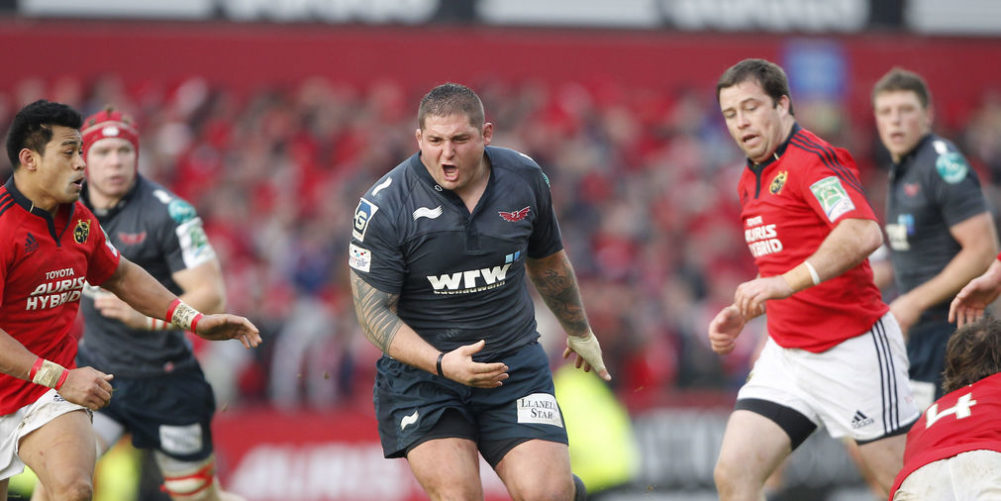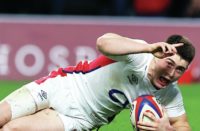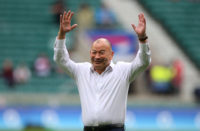By Peter Jackson
Rhys Thomas began the season waiting for a heart transplant at the Queen Elizabeth Hospital in Birmingham. He finished it, against all the odds, by making probably the bravest and certainly the most improbable of come-backs.
At a time when the column inches and social media equivalent keep racking up over Billy Vunipola‘s hamstring, Dylan Hartley‘s concussion and Manu Tuilagi‘s knee, their predicaments seem almost mundane compared to the on-going life-or-death issues endured by the former Wales prop.
There are celebrated examples of man’s indomitable spirit and then there is the case-history of Rhys Thomas, one so far from celebrated that the man himself swears that the sport he loves ‘abandoned’ him, not least in cocking a collective deaf ear to his claim that Welsh rugby owes him £90,000.
Despite all that, Thomas has pushed the bitter years behind him and reinvented himself as a part-time coach. He could be found twice a week for most of the season halfway up the Welsh League pyramid with Newport High School Old Boys in Division 3, East A.
It is surely the only place in the rugby world where you find a coach who takes 17 tablets a day for his heart condition and turns up for work with a bag slung across his shoulder. It contains the batteries to keep the implanted mechanical part of his heart beating.
“I was on the transplant list for, gosh, two years. As I got closer to the top of the list, the surgeons advised me that if I had the operation, I had a one in two chance of surviving. So there was a 50-50 chance I would not come through it.
“I thought: ‘Well, I’ve got my health and I’m not desperately ill’. The machine I’ve got does give me a decent quality of life. I can go about my day-to-day business which is not a lot.
“I do a bit of coaching and bits and bobs with the kids. I don’t have the most extravagant of lifestyles. I’m pretty limited. It depends how I feel. One day I can be fine, then the next I could be in hospital and kept there for three months at a time.”
Thomas made his debut for Wales in Buenos Aires in June 2006 shortly before the onset of heart issues. He recovered and had played his way back for six more Tests when a near-fatal heart attack during training with the Scarlets put an end to his career in January 2012.
A quadruple bypass was only the start. Two years later he survived a 13-hour operation carried out by three heart transplant surgeons for the implant of a VAD as in Vertricular Assist Device, a piece of apparatus developed at a cost of £100,000.
The National Heart, Lung and Blood Institute describe it as ‘a mechanical pump that takes blood from the lower chamber of the heart and helps pump it to the body and vital organs just as a healthy heart would’.
It comes equipped with a power source through Thomas’ abdomen that connects to a control unit. It gives warnings and alarms if the power is low or if the device is not working well.
When that happens he plugs a recharged battery into his in-built power point.“There are all sorts of risks which come with the VAD but it keeps me alive,” he says. “But as long as the machine keeps working, there shouldn’t be an issue. Every night I’m plugged in.
“I’ve got four batteries. Each one lasts between six and eight hours. After seven hours the VAD will start to bleep and that gives me 15 minutes to change the old battery for a new one.
“If you don’t do it in time the machine stops and that means your heart is liable to stop as well. That’s why I wear a manbag wherever I go. I’ve had some close calls but I’m surviving.
“I take ten tablets in the morning, five in the afternoon and two at night. My blood pressure can be volatile, either too high or too low. If I don’t take one of the pills for one day I am liable to start feeling unwell.
“I had my appendix taken out last year which turned out very nearly to be a complete and utter disaster. Post-op, I had a massive internal bleed. I was so bad I couldn’t recognise my wife.
“That was touch and go, a seriously close call. I was in the intensive care unit for two weeks and in hospital for three months. After the appendix operation, I got moved up on the list for a transplant. That was probably the worst eight or nine months of my life, waiting every minute of every day and wondering if my phone was going to ring. I couldn’t sleep. It was horrendous.
“Once they knew my heart was stable we made the decision last October that it would be in my best interests because of the risks involved to come off the transplant list and carry on as I am.
“I’ve always kept a positive outlook. I’m lucky. I’m alive, I have a beautiful wife, four lovely kids and lots of friends. I’m 35 now and I never thought I’d live that long. My wife thinks I am here for a reason on the basis that any normal person going through what I’ve gone through would be dead by now.
“Since my heart attack six years ago this is the longest period I have been out of hospital. I’ve had six clear months thanks to the incredible staff at the Queen Elizabeth Hospital.
“Now when I go back there it’s because I’ve been asked to talk to other patients with similar heart problems, to tell them that it’s not all doom and gloom, that you can carry on with your life despite everything. The traumas have taught me to enjoy the now. You never know what’s round the corner.”
His return to rugby with Newport HSOB, whose alumni include five Lions – Keith Jarrett, David Watkins, John O’Shea, Stuart Watkins and David Burcher – has been therapeutic. Thomas is still ‘disgusted’ that his fight for compensation has fallen on stony ground.
“I still can’t believe that the WRU, Pro Rugby Wales (the regions’ umbrella organisation) or the Welsh Players’ Union haven’t helped me get the money I deserve. They owe me £90,000.
“You are entitled to that when you’ve had a career-ending injury before you’re 30. The doctors have said that my retirement was not forced because of illness. These days players are getting 90 grand for wrist injuries. That made me bitter for a long time but I’m over it now.”
And it does put the Vunipola hamstring into its proper perspective.
*This article originally featured in TRP’s 6 May 2018 edition.























